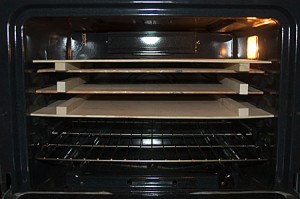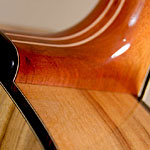A number of guitar builders (including a couple of well-known factory-made brands) follow the practice of baking the Spruce tops in an oven at low heat prior to using them in the construction of an instrument.
 This practice has caused a lot of discussion among luthiers and more than a little skepticism. According to some, baking Spruce increases its tonal qualities by affecting the resin in the cellular structure of the wood. Baking also supposedly accomplishes other structural changes that add to the musicality of the top. Some builders swear by this technique; many others dismiss it as sales hype and myth.
This practice has caused a lot of discussion among luthiers and more than a little skepticism. According to some, baking Spruce increases its tonal qualities by affecting the resin in the cellular structure of the wood. Baking also supposedly accomplishes other structural changes that add to the musicality of the top. Some builders swear by this technique; many others dismiss it as sales hype and myth.
I bake all my tops, but for a different reason and one that I suspect is the true motivation for many who do so: Baking reduces the moisture content of the wood to near zero. The wood then stabilizes at equilibrium with the relative humidity of the shop, which is maintained at 45-50% year round. This in effect is like pre-shrinking a pair of jeans. The wood, having been taken to as a low a moisture content as it will ever be again along with the resulting shrinkage, is much less likely to cause the guitar owner problems in the future due to seasonal wood movement caused by fluctuations in temperature and humidity. Wood treated in this way also has the best possible preparation for glue adhesion.
All wood is subject to this seasonal movement, and the majority of acoustic guitar players I know are unaware of just how much the thin wood used in stringed instruments can shrink and swell. They are also unaware of the importance of keeping their guitars humidified to the correct level, and the deleterious affects that failing to do so will have on the guitars. Excessive drying can cause cracks, sharp fret ends, and soundboard shrinkage that affects the action and playability. Baking guitar woods prior to construction helps to minimize the potential for damage should the guitar be subject to incorrect conditions.
Any tonal benefits that come from “setting the resins” or other structural changes are merely a side benefit. Of course, I’ll gladly accept them if in fact they occur! But the bottom line is that there is no substitute for the wonderful things that the aging process does to stringed instruments and their tone. But baking guitar wood can help your instrument live to a ripe old age.

